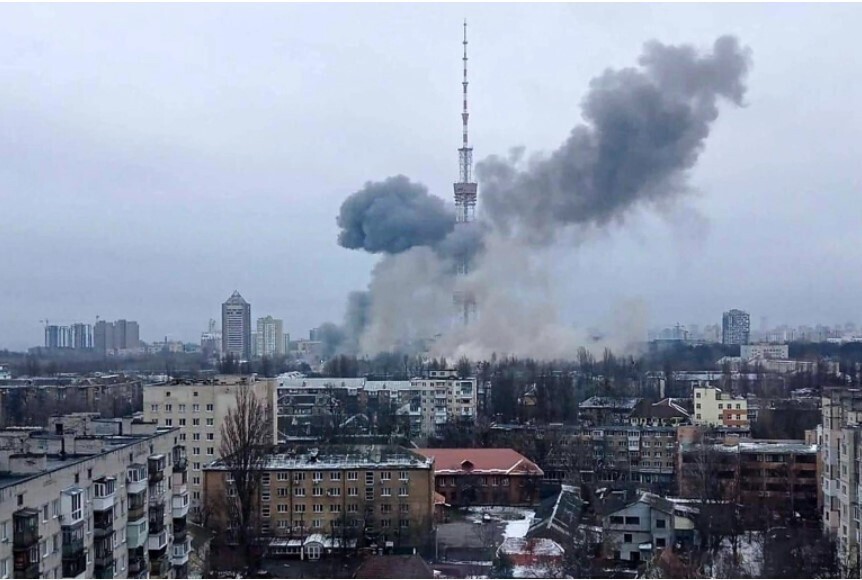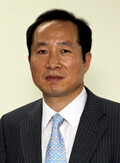hankyoreh
Links to other country sites 다른 나라 사이트 링크
[Column] What S. Korea’s presidential hopefuls should learn from tragedy in Ukraine


By Park Hyun, editorial writer
The seeds of the tragedy now unfolding in Ukraine date back to 1994. No sooner had the Soviet Union disintegrated than Ukraine suddenly had the world’s third-largest stockpile of nuclear weapons.
Russia was still in charge of the button for using them, but Ukraine had around 1,900 nuclear warheads and 2,500 tactical nuclear weapons deployed in it.
Feeling uneasy over the prospects of a newly independent country owning nukes, the US and Russia were in agreement about the need for a denuclearized Ukraine.
After several years of resisting the demands of the US and Russia, Ukraine finally reached an agreement with them and the UK in 1994 on the Budapest Memorandum. The country’s hope was that the memorandum would provide an escape from economic collapse and international isolation.
Under this agreement, the US and UK would provide economic assistance in exchange for Ukraine transferring its nuclear weapons to Russia, with the three countries pledging to guarantee its security.
That pledge wasn’t a security guarantee in terms of international law, which is why the agreement was called a “memorandum” rather than a “treaty.” Perhaps the current situation could have been avoided if Ukraine had received guarantees from the US and UK at the time that they would send troops to preserve its sovereignty and territory in the event of an armed attack.
The same year saw another fateful development for Ukraine. In 1990, the US had made an oral promise to the Soviet Union that NATO would not expand eastward — but that stance changed with the midterm congressional elections in 1994.
After Republicans advocating an eastward expansion policy took over both the Senate and House, the Democratic administration under then-President Bill Clinton also changed its stance and began pushing for NATO’s expansion into Central and Eastern Europe.
NATO subsequently took on 14 new members in those regions including the three countries of the Czech Republic, Poland and Hungary in 1999 and seven more in 2004. The US even began deploying its missile defense system in Romania and Poland. The brief honeymoon between the US and Russia came to an end, and there were now only three countries left bordering Russia that were not NATO members: Belarus, Ukraine and Georgia.
In 2008, Russian President Vladimir Putin invaded Georgia, harboring pipe dreams of recreating the Soviet Union’s past glories. Meanwhile, Belarus remains effectively a Russian satellite state, as this war has shown.
In 2014, Putin forcibly annexed the Crimean Peninsula in Ukraine; now he is attempting to set up a pro-Russian regime in the country. The situation is a tragic illustration of what sort of fate a smaller, weaker country can face when it is caught between major powers in an unstable situation where the post-Cold War order in Eurasia has not yet been firmly established.
The candidates in this year’s presidential election in South Korea have shown clear discrepancies in the lessons they’ve taken from the tragedy in Ukraine. The conservative ones have referred to it as underscoring the importance of peace through power and strong alliances, while the progressive ones have been arguing that it shows the need to maintain a strategic balance between powers.
At a basic level, both these arguments are accurate. But a more objective consideration of the reality shows clear differences between South Korea and Ukraine.
To begin with, South Korea is incomparably stronger than Ukraine in terms of military and economic might. Militarily, it ranks sixth in the world, while Ukraine ranks 22nd. Economically, it ranks in the top 10; Ukraine comes in at 57.
Not only that, but the South Korea-US alliance includes a Mutual Defense Treaty, which states that the US military is to intervene in accordance with legal procedures if South Korea is subjected to an armed attack.
In geopolitical terms, South Korea’s situation is quite similar to Ukraine — or perhaps even more precarious. It occupies a position where the interests of four major powers collide: the US and Japan on one side, China and Russia on the other. It’s where US hegemonism and Japanese historical revisionism come up against Chinese nationalism and Russia’s reckless great-power chauvinism — not to mention North Korea’s nuclear adventurism.
When a country occupies a geopolitical position like this one, maintaining a strategic balance is vital for its survival. It’s short-sighted to argue that it ought to simply hurry up and side with any one of those powers. As a country that lives on trade, it should be adhering to multilateralism and pursuing the universal values of democracy, a market economy and human rights.
In that sense, candidate Yoon Suk-yeol’s calls for additional Terminal High Altitude Area Defense, or THAAD, battery deployments and participation in the US missile defense system are the kind of dangerous rhetoric that stands to upset the strategic balance.
It’s clear to see that we’re poised to end up with a repeat of the same US-China conflict over THAAD deployment that we saw in the later stages of the Park Geun-hye presidency. There’s also ample potential for China to once again retaliate economically as it tries to keep its neighbors in line through high-handed diplomacy.
Beijing has already been reacting sensitively. On Monday, Chinese Foreign Minister Wang Yi said, “We should continue to properly handle sensitive issues to prevent unnecessary disruption and impact on China-ROK relations.” His mention of “sensitive issues” is being read as a reference to any additional THAAD deployment.
Arguments like Yoon’s have the potential not only to leave us facing a more troubled security situation but also to lead to a major blow to our economy. He needs to be more responsible with his words and actions.
Please direct questions or comments to [english@hani.co.kr]

Editorial・opinion
![[Column] Season 2 of special prosecutor probe may be coming to Korea soon [Column] Season 2 of special prosecutor probe may be coming to Korea soon](https://flexible.img.hani.co.kr/flexible/normal/500/300/imgdb/original/2024/0426/3317141030699447.jpg) [Column] Season 2 of special prosecutor probe may be coming to Korea soon
[Column] Season 2 of special prosecutor probe may be coming to Korea soon![[Column] Park Geun-hye déjà vu in Yoon Suk-yeol [Column] Park Geun-hye déjà vu in Yoon Suk-yeol](https://flexible.img.hani.co.kr/flexible/normal/500/300/imgdb/original/2024/0424/651713945113788.jpg) [Column] Park Geun-hye déjà vu in Yoon Suk-yeol
[Column] Park Geun-hye déjà vu in Yoon Suk-yeol- [Editorial] New weight of N. Korea’s nuclear threats makes dialogue all the more urgent
- [Guest essay] The real reason Korea’s new right wants to dub Rhee a founding father
- [Column] ‘Choson’: Is it time we start referring to N. Korea in its own terms?
- [Editorial] Japan’s rewriting of history with Korea has gone too far
- [Column] The president’s questionable capacity for dialogue
- [Column] Are chaebol firms just pizza pies for families to divvy up as they please?
- [Column] Has Korea, too, crossed the Rubicon on China?
- [Correspondent’s column] In Japan’s alliance with US, echoes of its past alliances with UK
Most viewed articles
- 1‘We must say no’: Seoul defense chief on Korean, USFK involvement in hypothetical Taiwan crisis
- 2Why Kim Jong-un is scrapping the term ‘Day of the Sun’ and toning down fanfare for predecessors
- 3Two factors that’ll decide if Korea’s economy keeps on its upward trend
- 4BTS says it wants to continue to “speak out against anti-Asian hate”
- 5After election rout, Yoon’s left with 3 choices for dealing with the opposition
- 6Gangnam murderer says he killed “because women have always ignored me”
- 7South Korea officially an aged society just 17 years after becoming aging society
- 8Noting shared ‘values,’ Korea hints at passport-free travel with Japan
- 9Ethnic Koreans in Japan's Utoro village wait for Seoul's help
- 10US citizens send letter demanding punishment of LKP members who deny Gwangju Massacre